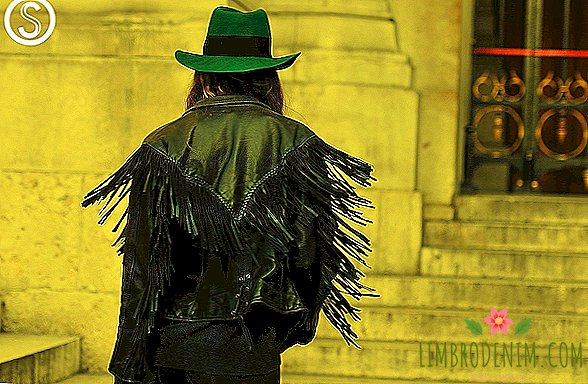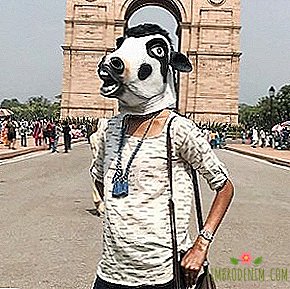Art critic and critic Irina Kulik about favorite books
IN BACKGROUND "BOOK SHELF"we ask heroines about their literary preferences and editions, which occupy an important place in the bookcase. Today, art critic, critic, author and presenter of the lecture series “Asymmetrical Similarities” at the Garage Museum Irina Kulik talks about her favorite books.

 I have not read paper books for a long time and, alas, I do not perceive reading as a separate special lesson. Therefore, for me, talking about reading is nostalgic: memories of pastime, to which I indulge less and less - except in the subway and on airplanes. I read most of the books we will talk about a long time ago and have not read it since. In general, I rarely return to books, as, indeed, I don’t watch movies, especially my favorite ones: I’m afraid to destroy the magic of old memories. Nabokov wrote somewhere that when he re-read Sherlock Holmes as an adult, it seemed to him that he came across an abridged edition.
I have not read paper books for a long time and, alas, I do not perceive reading as a separate special lesson. Therefore, for me, talking about reading is nostalgic: memories of pastime, to which I indulge less and less - except in the subway and on airplanes. I read most of the books we will talk about a long time ago and have not read it since. In general, I rarely return to books, as, indeed, I don’t watch movies, especially my favorite ones: I’m afraid to destroy the magic of old memories. Nabokov wrote somewhere that when he re-read Sherlock Holmes as an adult, it seemed to him that he came across an abridged edition.
There have been two intense periods of reading in my life. This is childhood and the time when I wrote a doctorate in Paris. In the Soviet period, drunken reading was the only entertainment: films and music were then almost not available, in any case, not like today. I remember the joy with which my parents read me aloud — Proust, for example. It gave them no less pleasure than me. The next period of drunken reading was associated with studies in France, where I wrote a dissertation on literature: the poetry of Dadaists, surrealists, and Russian Zaumi. My main entertainment in Paris was walks and books that I read in famous parks, from the classical Luxembourg garden to the modernist La Villette, on the embankments and even on Pere Lachaise, as well as in libraries such as the Pompidou library and the library Saint Genevieve, with her green lamps and strict librarians.
Parks and library books in Paris are also free fun for a poor student in this expensive city. But I loved the world of Parisian second-hand booksellers and book sales - the abundance was incredible. Plus, the time of writing a dissertation is the space for procrastination of any kind: along with everything I had to read on the topic, I, of course, read a lot of things that didn’t belong to her at all - for example, modernist science fiction, Burroughs, Ballard, Philip Dick, William Gibson. But ultimately this also helped the dissertation.
Now I often read the Internet - or rather, I do not read, but I seek information for lectures. But I still sometimes take up novels - as a simple consumer of literature, who needs a world where they can escape.

Andre Breton
"Nadja"
The exotic name of the heroine of the founder of surrealism stuck more than usual. Breton is just one of the authors with whom I spent a lot of time while writing a thesis. This is a very important figure for me: I love the surreal worldview, and although Breton has a reputation as a charismatic tyrant who liked to exclude everyone from surrealism, as a party, (Dali and Giacometti, for example), he still draws me.
"Nadja" came to me under romantic circumstances: it was presented to me by a beautiful young Frenchman, with whom we traveled by car through Poland, Germany, Holland to France. In Paris, a friend wrote me to the university, where I eventually defended my thesis. "Nadja" is a book documenting the surreal experience of penetrating parallel reality. Following the exotic and semi-insane Slavic girl, drifting behind her through the familiar city, the narrator gets from a real Paris to Paris a dream, phantom and surreal. And this experience, which is very important, is illustrated by the images of Cartier-Bresson, Brassai and other great photographers selected by Breton himself - because it is the camera that can capture the otherworldly. Well, reading this book in Paris, I identified myself in many ways with Nadzhey.
Herman Melville
"Moby Dick"
The last great classic "brick" that I read in my life. Foreign literature at our institute was taught fantastically well. In the early nineties, when little else had been translated, our teacher was already reading us the history of classical literature through the optics of structuralism and poststructuralism, retold Michel Foucault and Roland Barth.
Moby Dick struck me not as an adventure, but as an epistemological novel, with all this information about whales, with a very modern and conceptual mixture of adventure novel, scientific literature, allegory - and the very old-fashioned charm of science still involved in the overall picture of the world. This is very similar to what some contemporary artists are doing, reflecting on nostalgia for encyclopedic and all-encompassing charm.
Howard Lovecraft
The first book of this great American author came across to me during the summer holidays in the Soviet south - where the most terrible was the great boredom of that era, when there was no internet and even normal bookstores and it was almost like to remain without cigarettes without reading books. I managed to buy a collection of Lovecraft with a monstrous polygraphic design and an even more monstrous translation - as if it was made not by people, but by some people who are losing their human appearance and speech are quite Lovecraft monsters. I was very impressed.
Then I read Lovecraft in a French translation, on the contrary, very aesthetic - it reminded me of some Oscar Wilde tales. But lovecraft horror was inescapable. This writer is unique in that he does not retell something terrible, but makes you experience the very feeling of horror without describing anything - like in a dream when you wake up in a cold sweat without seeing that nightmarish picture, the foreboding of which made you wake up.
Pavel Pepperstein, Sergey Anufriev
"Mythogenic love caste"
I have a half-erased memory — not sure that it is true — that I met this book in manuscripts before it was published. These were huge common squared notebooks with drawings inside, very similar to the kind of "fan fiction" that my classmates in the Soviet school wrote in the back desks and the last pages of the notebooks - there also seemed to be something about the war and the "fascists." "Mythogenic love castes" in this form looked like a completely outsider literature.
The utter and monumental first volume struck me to the depths of my soul precisely with my inspirational absurdity, unwillingness to reckon with at least some literary rules. But without the "Mythos love of the castes" there would be neither Pelevin nor the late Sorokin. This is really a great literature - and, as becomes clear in the second volume, the most significant generational novel for my peers. This is not a curiosity, not a psychedelic “cart”, but the Russian equivalent of “Rainbow” by Thomas Pynchon - in scale and connection of the incompatible.
Philip dick
"Clouding"
The very experience of this novel is reminiscent of a hallucination or a false memory. I couldn’t believe for a long time that I really read him in the magazine "Youth", which I found, it seems, in the evening school, where I was then studying. And only then, after finding out that this “glitch” was still among several of my peers, I was convinced that Philip Dick’s amazing novel was indeed published in a Soviet youth magazine, apparently, as anti-drug propaganda.
They also published them with illustrations - strangely similar to the film that was drawn much later on "Blurred" by Richard Linklater, although, of course, adjusted for the aesthetics of the magazine "Youth". At that time I didn’t know either Philip Dick or the great tradition of drug literature - I experienced this experience from scratch. I must say that this is not bad anti-drug propaganda: there is no psychedelic romance in the paranoid badtrips of Dikovic heroes.
William Gibson
"Mona Lisa overdrive"
I am very interested in Baroque designs about the boundaries of the real and the unreal. And Gibson, as a true postmodernist, invents a world in which this mixture does not frighten, but delights, it should be so.
Gibson I read in French (English is not my first foreign language). In those translations, it was clear that this is not ordinary science fiction, but deliberately modernist prose, referring to Pynchon and Ballard. And I also like Gibson that this is the only science fiction writer I know who invents for his future - and in the latest novels already for our present - a very convincing and very original contemporary art that could become the main event of many biennials if it were realized by artists rather than written by a novelist.
Simon Reynolds
"Retromania. Pop culture in captivity of its own past"
Rock music plays a big role in my life - including for reasons that Reynolds so brilliantly analyzes, connecting music and nostalgia. Any song is a little cake "Madeleine": the book I read and fell in love in my youth does not wake up the same memories as a favorite album.
Reynolds’s book is written very coolly, with a lot of information - and at the same time very coherent, personal, with a close look at a generation. Reynolds writes how we missed the idea of utopia - the thought of a happy common future is completely gone, and contemporary art is actively engaged in this.
Gilles Deleuze
"Francis Bacon. The Logic of Sensation"
A rare combination: this is Deleuze’s programmatic philosophical text, and a very precise and detailed art criticism analysis by Francis Bacon. I love Bacon very much, and I love sincerely - I remember his great retrospective at the Central House of Artist in the early nineties, to which I came, not knowing anything about the artist, - and "flew away." Deleuze clearly explains Bacon’s method, draws very interesting analogies with literature — with Beckett and Burroughs — and writes his philosophical opus as experimental prose, very reminiscent of Burrough’s special drive (by the way, Francis Bacon’s friend).
Leonora Carrington
"Hearing tube"
The newly translated wonderful novel by a surrealist artist, a book that seems to undergo genre metamorphosis all the time: it starts as a sad realistic story about an elderly lady who is sent to a nursing home, then turns into a detective in the spirit of Agatha Christie, and then into a conspiracy fantasy in the spirit of Umberto Eco.
At the same time it is very female and, not afraid to say, feminine prose: whimsical, amusing, easy, subjective and unobtrusively insisting on a female perspective and female characters where we used to read about male figures. The prose is also delightfully free in its ingenuity - Borges and Neil Gaiman would envy such an interweaving and turning over of acquaintances, it would seem, with a myth and plot.
Yury Khanyutin
"The reality of the fantasy world"
The first favorite movie book I read. This is a critic who worked in the Soviet era at the Institute of Cinema and wrote one of the most detailed apologies of science fiction films, which was possible in the seventies: from Melies to Solaris. An excellent collection of works - including "A Clockwork Orange" and "Devil" and dozens of dystopias. The inevitable “Soviet” ideological approach that made this book — with quotations from Marx in the preface — does not interfere at all.
Khanyutin wrote about science fiction as a criticism of capitalist society — but the directors themselves, and the Western colleagues, the left, like most intellectuals, would have agreed with him. In childhood, when these films seemed completely inaccessible, the book of Khanyutin gave not only information about them, but also surprisingly conveyed charm. A Soviet film critic wrote for readers who hardly had the opportunity to see all these pictures - and perfectly mastered the gift of describing films that was lost due to uselessness - only Mikhail Trofimenkov did the same wonderfully. This book is guilty of my cinephilia, that I skipped the whole institute in the Cinema Museum that had opened then — with delight recognizing shots and scenes that I knew not from photographs, but from the texts of Khanyutin.
Alexander Vadimov, Mark Trivas
"From the magicians of antiquity to the illusionists of our days"
The favorite book of childhood, detailed history of the art of magicians - from ancient Egyptian priests, Indian fakirs and medieval areal representations to Harry Houdini. One of the authors of the book is the famous Soviet illusionist, speaking under the exotic pseudonym Alli-Wad in the image of a mysterious Indian in a turban.
The author writes "from the inside" of the profession - and that is why he does not turn in his colleagues and never definitively exposes the tricks. But he cites amazing descriptions of tricks of all times and peoples and biographies of the great masters of illusions: Cagliostro, Melies, Houdini. One of the incredible stories of the real magician, apparently, also formed the basis of the novel by Christopher Priest "Prestige" and the film by Christopher Nolan. For me, this book is probably connected with contemporary art, which also makes us wonder what we see and who and why we show it.




